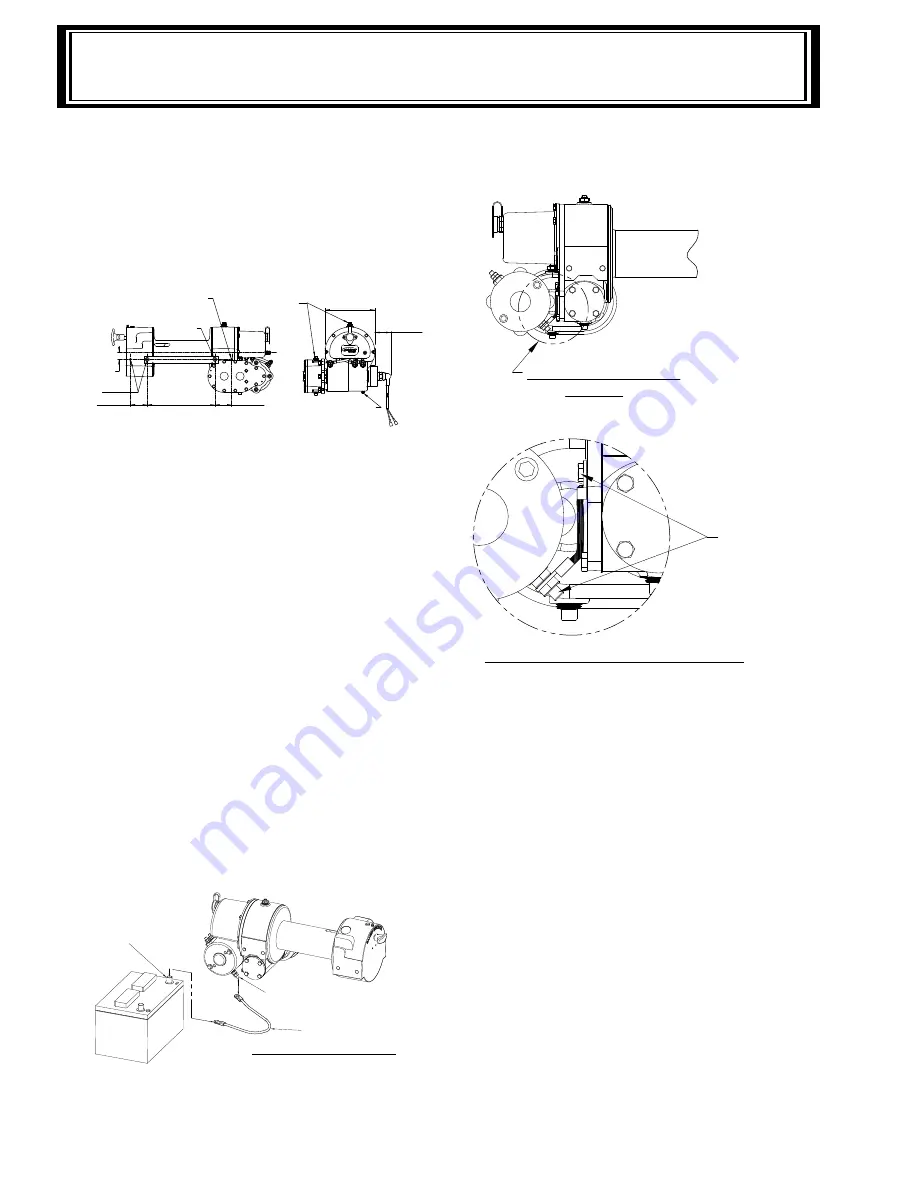
4
WINCH INSTALLATION
Winch Installation
NOTE: The winch must be mounted to angles
9 x 63 x 63 (3/8” x 2-1/2” x 2 1/2” minimum)
high strength 344,000 kPa (50,000 PSI) yield
steel angle or in a frame with both sides of the
clutch housing and gear housing bolted to the
angles or frame.
See diagram below for recommended
mounting dimensions.
Note various thread depths of mounting holes
and use correspondingly different bolt lengths
for proper mounting.
Substitution of attaching hardware items) bolts, nuts, or
washers) different from those supplied with your winch
mounting kit can lead to failure causing damage or serious
injury. Use a socket head mounting bolt on side with Spur
Gear Housing (see diagram) to prevent clearance prob-
lems. Use SAE grade 5 bolts or better.
Electrical Connections and Operations
For normal self-recovery work, your existing electrical sys-
tem is adequate. Your battery must be kept in good condi-
tion. A fully charged battery and proper connections are
essential. Run the vehicle engine during winching opera-
tion to keep battery charged.
Connect red cable from stud on plastic solenoid cover on
winch to emergency stop solenoid. Important: Hold inner
nut with end wrench while tightening outer nut. Install
emergency stop switch and solenoid per kit # 282067
(12V) or 282068 (24V) as applicable.
Connect black cable from motor isolated ground terminal
to negative battery terminal (as shown above). A good
electrical ground is required for proper performance.
In applications where the chassis is non-grounded, a jumper wire
(#440315) will be required between the winch and the motor isolated
ground terminal. (See Illustration Below)
The remote control switch is waterproof and has push
button stations on either side. It is designed this way to
prevent quick winch reversals, which lead to solenoid fail-
ure. Make sure the winch motor has stopped fully before
reversing.
When first setting up your winch, follow the directions for
inserting the proper “IN” or “OUT” label in the thumb but-
ton. The switch is also color coded to aid you in determin-
ing the direction your winch will run.
Maintenance
Check monthly the action of the sliding clutch, making sure
it is fully engaging and disengaging with the rope drum.
With the clutch in the engaged position, remove the plastic
plug in top of the housing and observe if the clutch is fully
engaging. If clutch is not fully engaging, inspect the clutch
shifter assembly parts, check for damage or excessive
wear and replace as necessary. Observe the jaws on both
the clutch and rope drum, checking for rounding of the
driving faces.
WINCH WILL NOT OPERATE UNLESS
GROUND CABLE IS INSTALLED FROM THE
ISOLATED GROUND TERMINAL TO THE
NEGATIVE BATTERY POST.
(SEE DIAGRAM BELOW)
JUMPER CABLE
(#440315) MUST
BE INSTALLED
ON WINCH FROM
MOTOR ISOLATED
GROUND STUD TO
GEAR HOUSING
COVER BOLT AS
SHOWN FOR NON
GROUNDED CHAS-
SIS APPLICATIONS.
61,2 MM
2.41 IN.
7.44 IN.
188,8 MM
REMOVE RUBBER COVER FROM
RELIEF FITTINGS BEFORE PUTTING
WINCH INTO USE.
2.50 IN.
63,5 MM
1.12
28,5
DEEP THREADS
(EACH SIDE)
3/8-16 x .75"
257,2 MM
10.19 IN
63,5 MM
2.50 IN.
ATTACH BLACK GROUND CABLE
TO THE ISOLATED GROUND
TERMINAL OF THE WINCH MOTOR
ON SIDE WITH SPUR GEAR HSG.
USE SOCKET HEAD MTG BOLTS
(EACH SIDE)
3/8-16 x 0.50" DEEP THREADS
3/8-16x1" DEEP
THREADS
(EACH SIDE)
NEGATIVE BATTERY POST
GROUND CABLE
ISOLATED GROUND
TERMINAL
Isolated Motor Ground
SEE ILLUSTRATION
BELOW
Non-Grounded Chasis Applications
For non-grounded chassis applications a jumper wire
(#440315) is required to ground the solenoid assembly.































